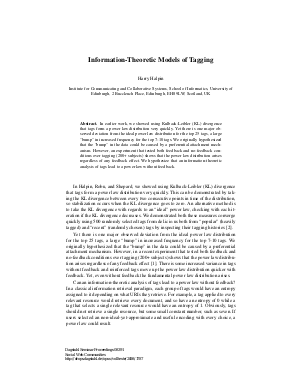Information-Theoretic Models of Tagging
Author Harry Halpin
-
Part of:
Volume:
Dagstuhl Seminar Proceedings, Volume 8391
Part of: Series: Dagstuhl Seminar Proceedings (DagSemProc) - License:
 Creative Commons Attribution 4.0 International license
Creative Commons Attribution 4.0 International license
- Publication Date: 2008-12-22
File

PDF
DagSemProc.08391.8.pdf
- Filesize: 48 kB
- 2 pages
Document Identifiers
Subject Classification
Keywords
- Tagging information theory feedback
Metrics
- Access Statistics
-
Total Accesses (updated on a weekly basis)
0Document
0Metadata
Abstract
In earlier work, we showed using Kulback-Leibler (KL) divergence that tags form a power law distribution very quickly. Yet there is one major observed deviation from the ideal power law distribution for the top 25 tags, a large "bump" in increased frequency for the top 7-10 tags. We originally hypothesized that the "bump" in the data could be caused by a preferential attachment mechanism. However, an experiment that tested both feedback and no-feedback conditions over tagging (200+ subjects) shows that the power law distribution arises regardless of any feedback effect. We hypothesize that an information-theoretic analysis of tags lead to a power law without feedback.
Cite As Get BibTex
Harry Halpin. Information-Theoretic Models of Tagging. In Social Web Communities. Dagstuhl Seminar Proceedings, Volume 8391, pp. 1-2, Schloss Dagstuhl – Leibniz-Zentrum für Informatik (2008)
https://doi.org/10.4230/DagSemProc.08391.8
BibTex
@InProceedings{halpin:DagSemProc.08391.8,
author = {Halpin, Harry},
title = {{Information-Theoretic Models of Tagging}},
booktitle = {Social Web Communities},
pages = {1--2},
series = {Dagstuhl Seminar Proceedings (DagSemProc)},
ISSN = {1862-4405},
year = {2008},
volume = {8391},
editor = {Harith Alani and Steffen Staab and Gerd Stumme},
publisher = {Schloss Dagstuhl -- Leibniz-Zentrum f{\"u}r Informatik},
address = {Dagstuhl, Germany},
URL = {https://drops.dagstuhl.de/entities/document/10.4230/DagSemProc.08391.8},
URN = {urn:nbn:de:0030-drops-17876},
doi = {10.4230/DagSemProc.08391.8},
annote = {Keywords: Tagging information theory feedback}
}
